Impact of COVID
2021 Survey of COVID Pandemic Impact
on Personal/Family Finances of
Pastors in the USA & Canada
Synopsis of Results
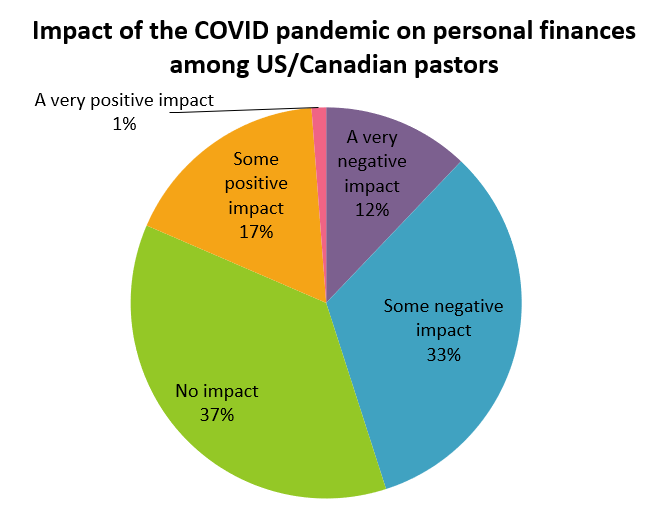 The COVID pandemic has had an impact on the personal finances of 73% of our US and Canadian Nazarene pastors, with 45% of pastors reporting a negative impact and only 18% reporting a positive impact. Despite the negative impact on 45% of the pastors, only 18% reported that the state of their personal finances was in “some” to “serious” difficulty. Yet, that is still approximately 1 out of every 5 pastors having financial difficulties, and 2 out of 5 reporting that their finances are “tight but [they are] managing.” Additionally, 20% of pastors expect their financial situations to be “a little worse” to “a lot worse” over the next 12-18 months.
The COVID pandemic has had an impact on the personal finances of 73% of our US and Canadian Nazarene pastors, with 45% of pastors reporting a negative impact and only 18% reporting a positive impact. Despite the negative impact on 45% of the pastors, only 18% reported that the state of their personal finances was in “some” to “serious” difficulty. Yet, that is still approximately 1 out of every 5 pastors having financial difficulties, and 2 out of 5 reporting that their finances are “tight but [they are] managing.” Additionally, 20% of pastors expect their financial situations to be “a little worse” to “a lot worse” over the next 12-18 months.
Analysis of the negative impacts from the COVID pandemic, revealed three primary negative impacts. These are 1) increased financial responsibility for others, 2) increased personal/family debt, and 3) decreased income for the pastor. Nearly half of the pastors reported an increase in monthly expenses of 10% or more, and 1 out of 3 pastors had a loss of income of 20% or more. Therefore, it is not surprising that more than half of the pastors incurred additional debt during the pandemic, with 1 out of 3 pastors accruing more than $1,000 of additional debt.
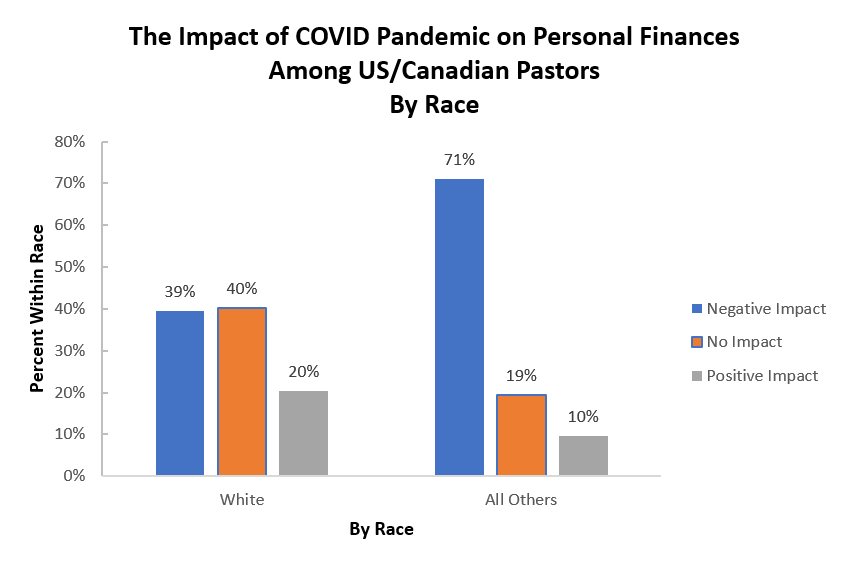 Further analysis of the survey results by racial groups revealed the same three primary negative impacts for white/Anglo pastors and the minority pastors. However, the degree of impact on minority pastors was significantly greater than the impact on the white pastors. White pastors were twice as likely to report no impact or a positive impact on their personal/family finances from the pandemic than their minority colleagues. In fact, 71% of minority pastors reported a negative impact while only 39% of white pastors reported a negative impact.
Further analysis of the survey results by racial groups revealed the same three primary negative impacts for white/Anglo pastors and the minority pastors. However, the degree of impact on minority pastors was significantly greater than the impact on the white pastors. White pastors were twice as likely to report no impact or a positive impact on their personal/family finances from the pandemic than their minority colleagues. In fact, 71% of minority pastors reported a negative impact while only 39% of white pastors reported a negative impact.
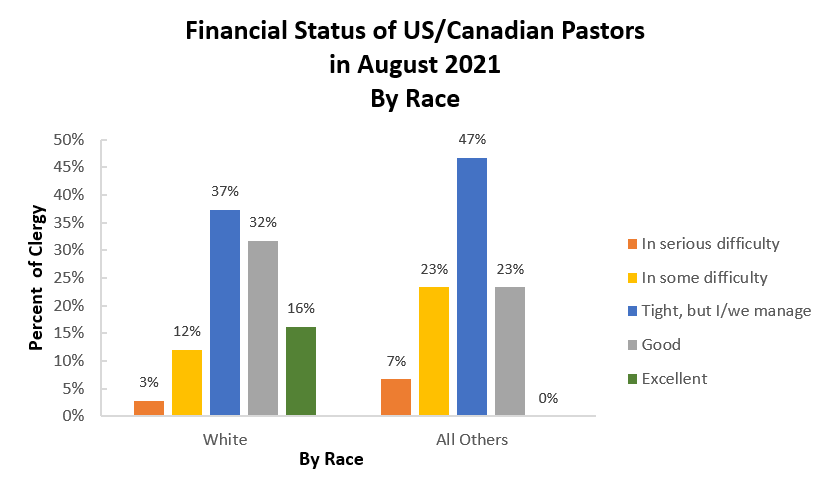 In describing their current personal/family financial situations, minority pastors were twice as likely as white pastors to say they were having “some” or “serious” difficulty, and minority pastors were half as likely to say their finances were “good” or “excellent.” Actually, none of the minority ministers described their finances as “excellent.”
In describing their current personal/family financial situations, minority pastors were twice as likely as white pastors to say they were having “some” or “serious” difficulty, and minority pastors were half as likely to say their finances were “good” or “excellent.” Actually, none of the minority ministers described their finances as “excellent.”
Additional analyses of the survey data uncovered a significant difference in negative impacts on pastors from different sized churches. 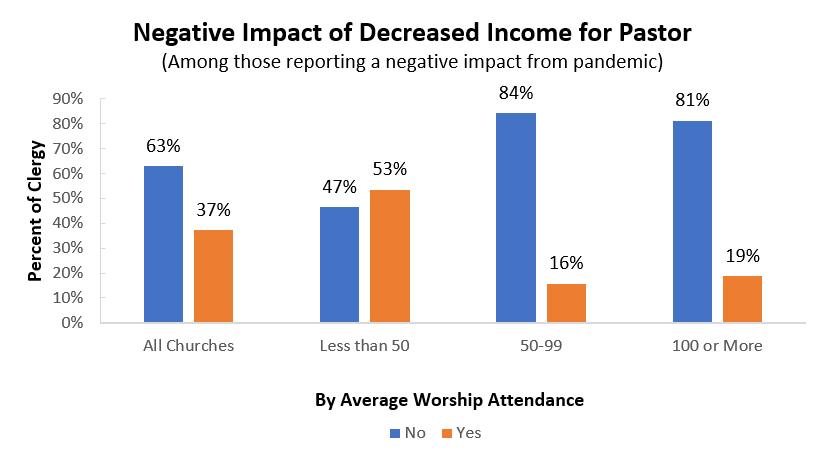 Pastors in churches with less than 50 in average worship attendance were more likely to report the negative impact of decreased income for the pastor than those in churches of 50 or more. Interestingly, pastors in churches with average worship attendance of 50-99
Pastors in churches with less than 50 in average worship attendance were more likely to report the negative impact of decreased income for the pastor than those in churches of 50 or more. Interestingly, pastors in churches with average worship attendance of 50-99 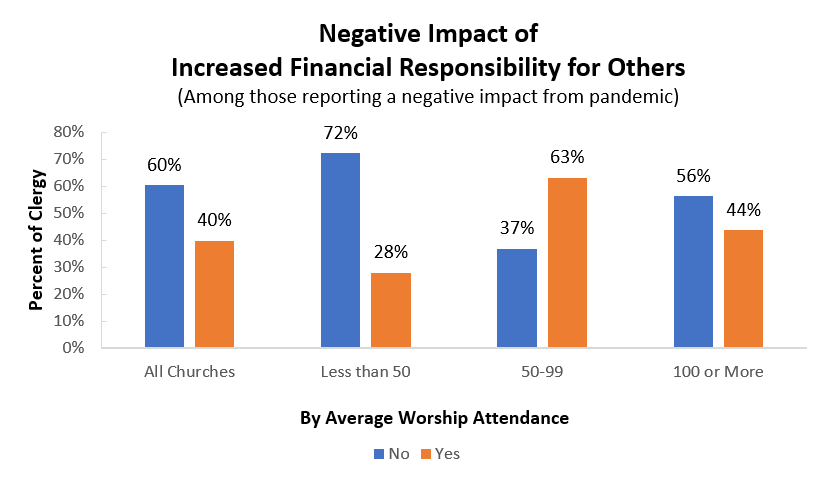 were more likely than those in larger and smaller churches to experience an increased financial responsibility for others.
were more likely than those in larger and smaller churches to experience an increased financial responsibility for others.
Differences between the ministerial role of Pastor and Associate Pastor became apparent in the negative impact of increased monthly expenses. Associate Pastors were more likely to report no increase in monthly expenses than Pastors, and Pastors were more likely to report increases of 30% or more. Also, ministers under the age of 40 were less likely to be in the role of Pastor.
In the analysis of those who reported a positive impact on their finances from the pandemic, nearly half of the Pastors (43%) reported a decrease in personal/family debt, whereas only 9% of Associate Pastors reported a decrease. It also revealed that ministers in their 40s and 50s were less likely to have been positively impacted by the CARES Act stimulus checks than other age groups, and they were more likely to have been positively impacted by additional employment for themselves.
This survey of the impact of the COVID pandemic on the personal/family finances of our US and Canadian pastors brings to light the fact that our non-white Nazarene ministers have experienced, and are experiencing, a more significant negative impact than our white ministers. It also revealed a decrease of income and an increase in expenses for Nazarene ministers serving in churches with an average worship attendance of less than 100. These are two groups of Nazarene ministers who could benefit from financial assistance.
